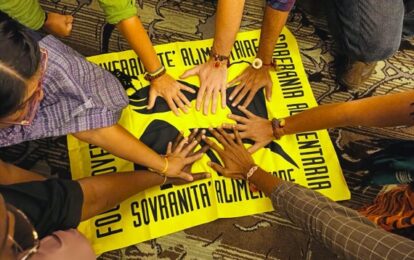ORFC 2026 8 – 9 Jan
ORFC 2026 8 – 9 Jan
Small Island Developing States (SIDS) comprise 58 countries and territories. The majority are situated in the Caribbean and Pacific and are particularly vulnerable to climate change. Over sixty percent of food consumed is imported, much of which is of low nutritional quality, contributing to high burdens of nutrition-related disease. Increasing the production and consumption of local nutritious foods is a goal of SIDS governments. This panel discussion will examine the current situation in SIDS and…
Dr. Zach Bush spent 17 years in academic medicine where he studied biochemistry, cellular biology, pharmaceutical management, disease and ultimately worked for many years in the hospital system. During the 1990’s and 2000’s he witnessed an epidemic of chronic disease in the US, that was hugely accelerated from previous decades where the main cause of death was trauma or infectious disease. He believes this is a result of the toxic pesticides that we have pumped…
The world is at a crossroad of multiple crises. Returning to look back to Indigenous wisdoms is vital as we look to the future. This session shares the journey of developing an Indigenous verification and validation system for Kai Atua (Pure Food) or Māori organics. It is a framework developed over a decade ago by the Māori Organics group - Te Waka Kai Ora and is fast becoming a pathway for Māori communities to reclaim…
This session will provide an overview of the climate crisis in these countries and the need for global and national policies. Speakers will share how the crisis in Pakistan devastated the country and the efforts that farmers have made to rehabilitate their communities with agroecology. Speakers from Bangladesh will share how they have used the floods to create a sustainable community development initiative.
This session will begin with a 35 minute screening of the film “Planet Local: A Quiet Revolution” which features grassroots activists from every continent alongside internationally known figures like Noam Chomsky, Jane Goodall, Pat McCabe and Gabor Mate. The film challenges the mainstream media narrative that “bigger is better” that has dominated economic thinking for centuries, and showcases initiatives that are already underway to protect and restore human-scale local economies, communities and the natural world,…
The Andhra Pradesh Community Managed Natural Farming Programme is a highly successful government-led initiative involving millions of farmers and eight million hectares of land in India. It revolves around nine key agroecological principles, including the use of indigenous seed, cover crops and keeping soil disturbance to a minimum. Probably most importantly it offers a viable alternative to using chemical fertilisers, pesticides and herbicides.
In 2020, members of the Alliance for Food Sovereignty in Africa (AFSA)…
Evoking past colonial practices, corporations are now using digital tools to entrench industrialised farming methods into the practices of small-scale farming and fishing communities. Current trends in digitalisation thus threaten biodiversity, the wider environment and human health. So far, few have challenged the tech industry’s hype about this ‘fourth industrial revolution’. This session will outline the issues, based on ETC’s recently-published report Food Barons, explore how we can assess the pros and cons of digital…
Most fungi live out of sight, yet they're all around us, and make up a massively diverse kingdom of organisms that support and sustain nearly all life on Earth. The more we learn about them, the more fascinating fungi become. In this conversation, Doug Bierend and Merlin Sheldrake will discuss some of the ways these extraordinary beings – and our relationships with them – change our understanding of the world in which we live.
In the midst of a global, multiple crisis the global movement for food sovereignty - of which La Via Campesina is an active part - is organising a new moment of discussion to build a strong counter-response at different levels (local, national, global) in alliance with other movements fighting for climate justice and the rights of workers, youth, women, gender diverse. Twenty-five years after the concept of Food Sovereignty was shaped, the moment is now…
